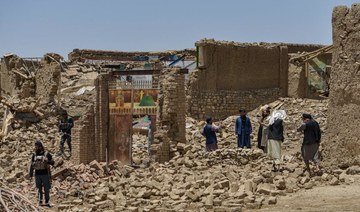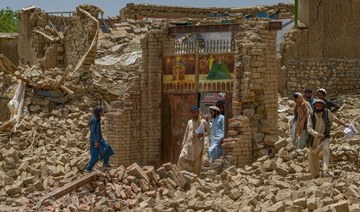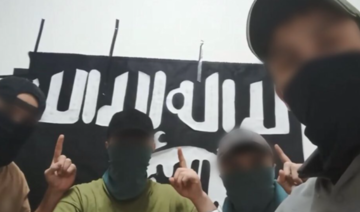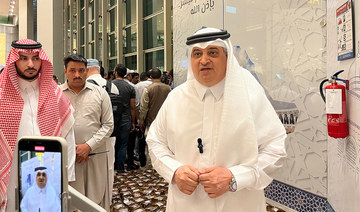ISLAMABAD: Afghan finance and central bank officials from the Taliban-led government departed for Qatar on Wednesday to meet with a US Treasury department official, after last week’s deadly earthquake highlighted how critical relief efforts have stumbled under the weight of the country’s spiraling economic woes.
Last week’s devastating earthquake in southeastern Afghanistan killed around 770 people, according to UN figures, though the Taliban put the death toll at closer to 1,150, with thousands injured. The UN says 155 children are among those killed in what was the deadliest earthquake to hit the impoverished country in two decades.
The quake struck a remote, deeply impoverished region of small towns and villages tucked among rough mountains near the Pakistani border, collapsing stone and mud-brick homes and in some cases killing entire families. Nearly 3,000 homes were destroyed or badly damaged in Paktika and Khost provinces.
News of a meeting between Taliban government officials and US officials was confirmed by Taliban Foreign Ministry spokesman Hafiz Zia Ahmad, who said the Afghan delegation will be led by Foreign Minister Maulvi Amir Khan Muttaqi. He said the officials will meet in Doha, Qatar with the US Special Representative for Afghanistan and officials from the US Treasury Department to discuss Afghanistan’s economic and banking sectors.
The Washington Post first reported Tuesday that senior Biden administration officials are working with Taliban leadership on a mechanism to allow Afghanistan’s government to use its central bank reserves to deal with the country’s severe hunger and poverty crises while erecting safeguards to ensure the funds are not misused.
The Biden administration froze some $9 billion in foreign Afghan central reserves after the Taliban seized power last August, prompting a chaotic and deadly withdrawal of US and NATO allied forces, as well as more than 100,00 Afghans and others.
The international sanctions that followed choked off bank transfers for months into the country, even for many aid groups still operating there. Afghans have since struggled to withdraw money from local banks and tens of thousands of public sector employees continue to see their salaries delayed as the Taliban leadership seeks ways to collect taxes and other fees to keep the government running.
No government has yet recognized the Taliban’s rule over Afghanistan. The former insurgents have resisted international pressure to maintain the previous rights gained by Afghan women, instead imposing restrictions on women’s dress and limiting access to schools for teenage girls.
Even before the Taliban takeover last year, Afghanistan’s economy had been deeply reliant on foreign aid. The UN and an array of overstretched aid agencies in the country have tried to keep Afghanistan from the brink of collapse, including the International Committee of the Red Cross which is paying the salaries of health care staff and the operational costs of more than 30 hospitals across the country.
Overstretched aid agencies said the earthquake underscored the need for the international community to rethink its financial cut-off of Afghanistan since Taliban insurgents seized the country. That policy, halting billions in development aid and freezing vital foreign reserves, has helped push the economy into collapse and plunge Afghanistan deeper into humanitarian crises and near famine.
Authorities and charities are struggling to access the far-flung region where the quake struck, and appear overwhelmed by the scale of the damage and the daunting task of debris removal, let alone reconstruction.
Survivors have had to dig through debris with their bare hands to search for missing loved ones as the ground continues to rumble with more aftershocks.
Taliban and US officials to meet amid quake relief efforts
https://arab.news/wnxez
Taliban and US officials to meet amid quake relief efforts
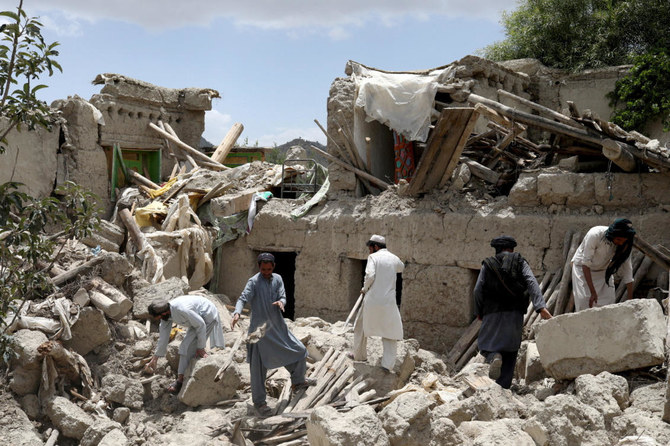
- Last week’s devastating earthquake in southeastern Afghanistan killed around 770 people
- Even before the Taliban takeover last year, Afghanistan’s economy had been deeply reliant on foreign aid
Universities take steps to prevent pro-Palestinian protest disruptions of graduation ceremonies
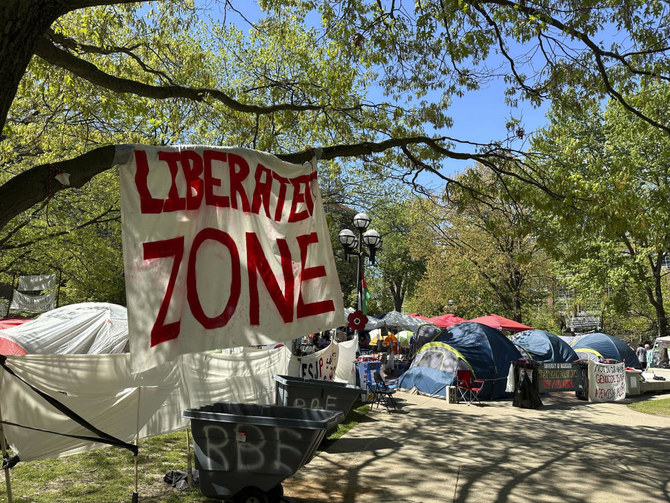
“People can exercise their First Amendment rights without disrupting or creating fear,” Burdick said of protesters
MICHIGAN, USA: With student protests over the Israel-Hamas war disrupting campuses nationwide, several major universities are intent on ensuring that commencement ceremonies — joyous milestones for graduates, their families and friends — go off without a hitch this weekend.
It won’t be easy. Colleges are hiring extra security, screening attendees at venues and emphasizing that significant disruptions by pro-Palestinian protesters won’t be tolerated. At the same time, they’re pledging to honor free-speech rights by designating protest zones.
Students booed and yelled “free Palestine” while the University of Utah president spoke Thursday night at commencement. He paused his speech to ask those who were protesting to leave or be removed. Outside the ceremony in Salt Lake City, a group of about 50 people were rallying. There was one arrest.
“Milestone is a perfect word,” said Ken Burdick of Tampa, Florida, describing his daughter’s graduation Saturday at the University of Michigan. He hopes the big day goes untarnished.
“People can exercise their First Amendment rights without disrupting or creating fear,” Burdick said of protesters.
Here’s how some schools are planning to balance things:
UNIVERSITY OF MICHIGAN
More than 8,000 graduates — and 63,000 spectators — are expected for Saturday’s festivities inside Michigan Stadium, known as The Big House. There will be security screening, and disruptive protesters could be subject to removal. Public safety officers and staff who commonly monitor major events, such as fall football games, will be present. Author and historian Brad Meltzer is the featured speaker.
In March, an annual event recognizing students with high academic achievement ended early when pro-Palestinian protesters raised provocative signs and drowned out remarks by President Santa Ono, yelling, “You are funding genocide!” The university subsequently drafted a policy that could lead to student expulsions and staff dismissals for event disruptions, though it hasn’t been finalized.
“It was painful for everyone who had gathered — and especially so for members of our Jewish community,” Ono said two days later.
Protesters have erected dozens of tents on the Diag, a historic space for campus activism more than a mile away from the stadium. They’re demanding that Michigan cut financial ties with companies connected to Israel. There has been no effort to break up the encampment and no arrests.
“We respect and uphold the principles of free expression, and also recognize that no one is entitled to disrupt university activities,” Laurie McCauley, Michigan’s chief academic officer, said in an email to students and staff about commencement.
Blake Richards, 25, is earning a bachelor’s degree in biochemistry. Richards plans to be at the football stadium Saturday after participating in a smaller ceremony Thursday for chemistry students.
“It could take away some great feelings, muddle them,” Richards said of any disruptions. “But truth be told, I’m not bothered. I know others have different opinions; I’m just happy to be here.”
INDIANA UNIVERSITY
The Bloomington, Indiana, campus is designating protest zones outside Skjodt Assembly Hall and Memorial Stadium, where ceremonies will be held Friday for graduate students and Saturday for undergraduates. Nearly 10,000 students are eligible to attend.
A social media post circulating on Instagram urged protesters to wear “your keffiyeh along with your cap and gown” and walk out during Saturday’s remarks by President Pamela Whitten.
Roughly 20 tents set up by protesters remained in place this week in an area known as Dunn Meadow, a mile from the stadium. Dozens of protesters have been arrested there recently, according to the Indiana Daily Student.
Maya Wasserman, a 22-year-old senior in management who is Jewish, said she and her family feel uncomfortable about the prospect of pro-Palestinian protests disrupting commencement. She expressed special concern for her mother and grandmother, who are Israeli.
“It’s unfortunate because we want this event to be about graduating, not politics,” Wasserman said.
At Dunn Meadow, students in lawn chairs or on blankets worked on their final assignments. Jessica Missey, a 20-year-old protester and senior, said she boycotted final exams; some professors, she said, simply canceled them. She has enjoyed the camaraderie at the encampment.
“Commencement is kind of just taking almost a little sidestep for me,” said Missey.
NORTHEASTERN UNIVERSITY
A week after police arrested nearly 100 protesters at Northeastern University, the school is holding its commencement exercises Sunday at Fenway Park, home of the Boston Red Sox, for the fourth consecutive year.
The venue will help security officials monitor the crowd and limit what people can bring. Signs, banners, balloons and full-size flags are prohibited in the stadium, along with most bags. Renata Nyul, vice president for communications, said public safety staffing will be strengthened.
All those entering Fenway will need to pass through metal detectors. About 50,000 graduates, family and friends are expected.
Northeastern is one of several universities in the Boston area that have had pro-Palestinian encampments. Some have let the protests continue, though Northeastern’s camp was broken up.
“While we realize that issues in the world prompt passionate viewpoints, the focus this weekend should be on our graduates and their remarkable achievements,” Nyul said.
German foreign minister says Russia will face consequences for cyberattack. NATO, EU show support

- “Russian state hackers attacked Germany in cyberspace,” Baerbock said
- “This is absolutely intolerable and unacceptable and will have consequences”
BRUSSELS: Germany’s top diplomat on Friday said Russia will face consequences after accusing its military intelligence service of masterminding an “absolutely intolerable” cyberattack, as NATO and European Union member countries said they will not let Russia’s “malicious” behavior in cyberspace go unanswered.
Relations between Russia and Germany were already tense, with Germany providing military support to Ukraine in its ongoing war with Russia.
German Foreign Minister Annalena Baerbock said Russian state hackers were behind a cyberattack last year that targeted the Social Democrats, the leading party in the governing coalition.
“Russian state hackers attacked Germany in cyberspace,” she said at a news conference in the Australian city of Adelaide. “We can attribute this attack to the group called APT28, which is steered by the military intelligence service of Russia.”
“This is absolutely intolerable and unacceptable and will have consequences,” she said.
The Council of the EU later said that Czechia’s institutions have also been a target of the cyber campaign.
In a statement by the EU’s top diplomat, Josep Borrell, the bloc’s nations said they “strongly condemn the malicious cyber campaign conducted by the Russia-controlled Advanced Persistent Threat Actor 28 (APT28) against Germany and Czechia.”
The EU noted that it had previously imposed sanctions on individuals and entities responsible for APT28 attacks targeting the German parliament in 2015. It said it will not tolerate the continuation of such attacks, particularly with EU elections upcoming in June.
NATO said that APT28 targeted “other national governmental entities, critical infrastructure operators and other entities across the Alliance,” including in Lithuania, Poland, Slovakia and Sweden.
“We are determined to employ the necessary capabilities in order to deter, defend against and counter the full spectrum of cyberthreats to support each other, including by considering coordinated responses,” said the North Atlantic Council, the principal political decision-making body within NATO.
Baerbock is visiting Australia, New Zealand and Fiji, with the trip focusing on security policy as China pushes for influence in the Pacific region.
“The defense cooperation between Germany and Australia is close and we would like to deepen it further and together expand it, because we are in a situation where we face similar threats,” said Baerbock, who is the first German foreign minister to visit Australia in 13 years.
Discussions between Baerbock and Australia counterpart Penny Wong centered on the conflict in Gaza. “I think we all understand that the only path out of this cycle of violence that we see in the Middle East at such great cost is one that ultimately ensures a two-state solution,” Wong said.
Saudi team in Manila to transport Filipino conjoined twins for surgery in Riyadh

- Akhizah and Ayeesha Yusoph will fly to Saudi Arabia aboard medical aircraft on Sunday
- First Filipino conjoined twins underwent successful separation surgery in Riyadh in 2004
MANILA: A Saudi medical team has arrived in Manila to transport two 16-month-old girls to Riyadh, who will undergo separation surgery in the capital under the Kingdom’s flagship program for conjoined twins.
Akhizah and Ayeesha Yusoph were born in Panabo City, Davao Del Norte province on the southern island of Mindanao in December 2022. Their bodies share one liver.
“It was in the seventh month that I found out that they were conjoined, when I had my ultrasound. I was shocked,” the children’s mother, Hashima Yusoph, told Arab News.
“All I was thinking at that time was how I can take care of them, how I can do my best to be a mother.”
Not knowing how to help her newborns, the 19-year-old started to look for help to make sure the girls would have a life that is as normal as it could be. It was when they were five months old that a local charity connected her with the King Salman Humanitarian Aid and Relief Center.
KSrelief was established by King Salman in 2015 and is headed by Dr. Abdullah
Al-Rabeeah, one of the world’s most renowned pediatric surgeons.
The Saudi Conjoined Twins Program spearheaded by Al-Rabeeah has, since 1990, separated more than 130 children from 25 countries, who were born sharing internal organs with their twins.
Akhizah and Ayeesha will be transported to Riyadh on a special medical aircraft on Sunday.
A reception in their and the KSrelief team’s honor was held by Saudi Ambassador Hisham Al-Qahtani on Friday.
The ambassador said that all the medical procedures, transportation and their stay in the Kingdom during treatment will be covered by the Saudi government, following King Salman’s decree.

“This royal initiative comes as part of the Kingdom’s wise leadership commitment — may God preserve it — to care for and concentrate on humanitarian work,” he told the guests and media.
“This humanitarian work reflects one of the prominent achievements of the Kingdom in the field of separating conjoined twins and providing outstanding medical care, where the Kingdom has become a pioneer in the field.”
Akhizah and Ayeesha will fly to Saudi Arabia with their mother and grandmother.
“I’m so happy it’s finally happening ... The doctors said they are very fit to undergo surgery,” Hashima said. “This is really life changing for us.”
Conjoined twins are a rare phenomenon, estimated to occur once in every 50,000 to 60,000 births.
In March 2004, another set of Filipino conjoined twins, Ann and Mae Manzo, underwent separation surgery in Riyadh.
Joined at the abdomen, the pelvis and the perineum, they were successfully operated on in King Abdulaziz Medical City by Al-Rabeeah and his team of 50 doctors and nurses.
Police clear pro-Gaza sit-in at top Paris university

- Administrators had closed Sciences Po’s main buildings in response to the sit-in and called for remote classes instead
- Protests have been slow to spread to other prominent universities
PARIS: Police entered Paris’ Sciences Po university on Friday to remove dozens of students staging a pro-Gaza sit-in in the entrance hall, AFP journalists saw, as protests fire political debate about the Israeli-Palestinian conflict.
One student told reporters “around 50 students were still inside the rue Saint-Guillaume site” when police entered.
Bastien, 22, told AFP he and other protesters had been peacefully brought out in groups of 10 by officers.
Another, Lucas, studying for a master’s degree, said “some students were dragged and others gripped by the head or shoulders.”
Administrators had closed Sciences Po’s main buildings on Friday in response to the sit-in and called for remote classes instead.
They said “around 70 to 80 people” were occupying the foyer of the central Paris building.
Prime Minister Gabriel Attal’s office said such protests would be dealt with using “total rigour,” adding that 23 university sites had been “evacuated” on Thursday.
Students from the university’s Palestine Committee had earlier told reporters they faced a “disproportionate” response from police, who had blocked access to the site before moving in.
They also complained of a lack of “medical assistance” for seven students who had started a hunger strike “in solidarity with Palestinian victims.”
Widespread protests
Sciences Po, widely considered France’s top political science school, with alumni including President Emmanuel Macron, has seen student action at its at sites across the country in protest against the war in Gaza and the ensuing humanitarian crisis.
Protests have been slow to spread to other prominent universities, unlike in the United States — where demonstrations at around 40 facilities have at times spiralled into clashes with police and mass arrests.
But demonstrations have so far been more peaceful in France, home to the largest Jewish population outside Israel and the US, and to Europe’s largest Muslim community.
The University of California, Los Angeles, announced that Friday’s classes would be held remotely after police cleared a protest camp there and arrested more than 200 people.
Sciences Po administration took the same step for its Paris student body of between 5,000 and 6,000.
Protesters occupied the entrance hall in a “peaceful sit-in” following a debate on the Middle East with administrators on Thursday morning that their Palestine Committee dubbed “disappointing.”
The university’s interim administrator, Jean Basseres, refused student demands to “investigate” Science Po’s ties with Israeli institutions.
War on Gaza
The war in Gaza began after Palestinian militant group Hamas launched an attack on Israel on October 7 that resulted in the deaths of 1,170 people, mostly civilians, according to an AFP tally of Israeli official figures.
Israel estimates that 129 hostages seized by militants during their attack remain in Gaza. The Israeli military says it believes 34 of them are dead.
Israel’s relentless retaliatory offensive on Gaza has killed at least 34,596 people in the Palestinian territory, mostly women and children, according to the besieged enclave’s Hamas-run health ministry.
Outside the Sorbonne University, a few hundred meters (yards) from Sciences Po in central Paris, members of the Union of Jewish Students in France (UEJF) were setting up a “dialogue table” on Friday.
“We want to prove that it’s not true that you can’t talk about the Israeli-Palestinian conflict,” UEJF president Samuel Lejoyeux told broadcaster Radio J.
“To do that, we have to sideline those who single out Jewish students as complicit in genocide,” he added.
In the northeastern city of Lille, the ESJ journalism school was blocked off, an AFP reporter saw.
Students at the city’s nearby branch of Sciences Po had their identities checked before they were allowed in via a back entrance to sit exams.
Around 100 students had occupied a lecture hall at Science Po’s Lyon branch late on Thursday, while a blockade at a university site in nearby Saint-Etienne was cleared on Thursday morning by police.
Cockfights still rule the roost in India’s forest villages

- India is renowned for its fanatical cricket obsession but in the central state of Chhattisgarh, cockfighting draws the crowds
- When a cockfight is on calendar, hundreds of men walk far across rivers, through dense bushland and over hills for ringside view
KATEKALYAN: The swing of a talon and a flurry of feathers leaves a rooster motionless, a cockfight bout viewed as cruel by many but which binds disparate Indian forest communities together.
India is renowned for its fanatical cricket obsession but in the central state of Chhattisgarh, cockfighting draws the crowds.
“Earlier there was no other entertainment and it helped us meet people from other villages,” Raju, whose skill in raising fighting fowl has made him something of a local celebrity, told AFP.
“Even with all the changes around us today, the sport is still very popular,” the 32-year-old added.
The forests of Bastar district are home to numerous tribal communities living in scattered villages.
India has pumped millions of dollars into infrastructure development, and new roads and mobile phone towers have brought the forest’s inhabitants somewhat closer to the outside world.
Rugged terrain and the tyranny of distance in remote Bastar district still lend few occasions for these villages to interact with each other.
But when a cockfight is on the calendar, hundreds of men will walk far across rivers, through dense bushland and over hills to get a ringside view.
“I do nothing but organize fights, raise roosters and place bets,” Bhagat, 35, of Katekalyan village told AFP.
Last month was Katekalyan’s turn to host a bout, with men from out of town ringing the fence of the dirt enclosure where roosters spar.
Most cockfights are over in the blink of an eye, with the pre-game pageantry accounting for most of the action.
Bhagat and a rival rooster owner first hold their bird’s beak to beak to gauge whether they have the necessary hostility to battle.
Both men then use twine to fix sharp blades to the claws of their charges as the crowd shouts out their small wagers on the outcome.
Along with much of the rest of the world, cockfighting is banned in numerous Indian states on animal cruelty grounds.
People for the Ethical Treatment of Animals (PETA) India calls cockfighting “barbaric,” and campaigns to shut it down for good.
But the men living in Bastar’s forests see it as an integral part of their community fabric.
Roosters that survive multiple bouts are lauded alongside their owners.
Raju said the most enduring fighters were locally remembered with the same reverence that the rest of India holds for cricketing greats like former captain Sachin Tendulkar.
“Like you have a field for cricket, this is our field,” he said.
“And the winners get fame and respect, just like Sachin did by scoring all his runs.”
Bhagat said it always grieved him when one of his animals died in combat.
“When we lose a rooster in the fight, our hearts are in pain for a few days,” he said.
“But then we get drunk, and then there will be peace.”



